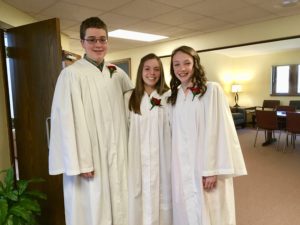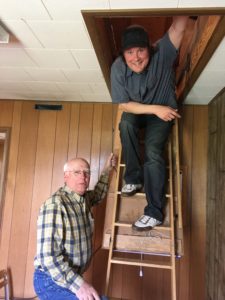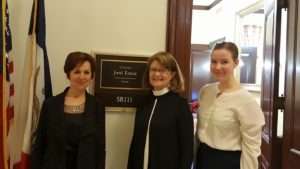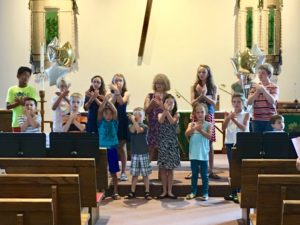 Today we rejoiced with Kristi-Kjome-Johnson, Mara Holland, and Nathan Larson as they affirmed the promises made to them in baptism. Each selected a Bible passage which had special meaning for them which they explained during the Children’s Message. Mara: Psalm 119:105- “Your word is a lamp unto my feet and a light unto my path.” Nathan: 2 Corinthians 5:7- “For we walk by faith, not by sight.” Kristi: Isaiah 41:10- “Fear not, for I am with you; be not dismayed, for I am your God: I will strengthen you, I will help you, I will uphold you with my righteous right hand.”
Today we rejoiced with Kristi-Kjome-Johnson, Mara Holland, and Nathan Larson as they affirmed the promises made to them in baptism. Each selected a Bible passage which had special meaning for them which they explained during the Children’s Message. Mara: Psalm 119:105- “Your word is a lamp unto my feet and a light unto my path.” Nathan: 2 Corinthians 5:7- “For we walk by faith, not by sight.” Kristi: Isaiah 41:10- “Fear not, for I am with you; be not dismayed, for I am your God: I will strengthen you, I will help you, I will uphold you with my righteous right hand.”
Confirmation on Sunday, April 29, 2018
This Week at Good Shepherd, April 30-May 6, 2018
 Tuesday, May 1 – Election Day Polling Location
Tuesday, May 1 – Election Day Polling Location
4:00 p.m. – Mary Circle – Marilyn Anderson hosts
Wednesday, May 2
7:30 a.m. – Men’s Breakfast
7:00 p.m. – Choir Practice
8:00 p.m. – Band Rehearsal
Thursday, May 3
10:00 a.m. – Bible Study with pastor – Narthex
Friday, May 4 – Church Women United May Friendship Day
9:00 a.m. – Decorah Lutheran Church
Sunday, – Sixth Sunday of Easter- St Grubby’s Day
9:30 a.m. – Worship with Holy Communion
10:30 a.m. – Fellowship Hour
10:50 a.m. – No Sunday School, Youth Forum or Adult Forum
Adult Forum, Sunday, April 29 – Ecumenical Advocacy Days
Hallie Johnson, Pr. Marion and Karen McLean will present about their experience traveling to Washington, D.C. on April 20-23
 to participate in Ecumenical Advocacy Days, in which the ELCA is a participating denomination. They’ll talk about what they learned about faith-based advocacy, and share their experience of participating in a lobbying day on Capitol Hill.
to participate in Ecumenical Advocacy Days, in which the ELCA is a participating denomination. They’ll talk about what they learned about faith-based advocacy, and share their experience of participating in a lobbying day on Capitol Hill.
Sermon for Sunday, April 22, 2018 – “How Far?”
Fourth Sunday of Easter
Good Shepherd Lutheran Church
Decorah, Iowa
Preacher: Daniel Grainger
Beloved of God, grace to you and peace from the one in whom we live and move and have our being.
How far are we willing to go?
This was the mantra running through my head last week after sitting in a conference room full of seminarians, listening to Law Enforcement officers walking us through an Active Shooter drill. It was the first time the Seminary had ever participated in this kind of training.
The presentation included a history of mass shootings since Columbine and an overview of how the tactics of Law Enforcement has evolved over the years in response to such violence. The law enforcement officers were not shy in lamenting with us in the militarization of our police and first responders.
How far are we willing to go?
How far must we go?
How far can we go?
As I reflected on these questions, I began to ponder our survival instincts: to “Fight, Flight, or Freeze,” – the adrenaline that kicks in during situations of high anxiety, trauma, or when danger is looming – eliciting one of three reactions (often unknowingly or without thinking) from us.
How far are we willing to go?
How far are we able to go – to survive?
Though we certainly can’t argue that our survival instincts have served us well throughout history, these same instincts kick in our daily lives. Of course, this is certainly not in response to danger and violence each and every day, but this same strategy and instinct for survival (fight, flight, or freeze) is often what we turn to (perhaps our default) when we need hope.
We need hope daily (big and small) in order to function; to successfully navigate our way through this world. But it doesn’t take long to realize that hope in our own capacities fall short all too often…
Today is the 48th occurrence of Earth Day, an annual event celebrated worldwide honoring the Earth and promoting environmental stewardship. The theme for Earth Day 2018 is “End Plastic Pollution” – raising awareness of how plastic waste is polluting and poisoning the oceans and land, causing incredible harm to flora and fauna, and having a devastating impact on our own health in ways we are just beginning to understand.
As our society faces this threat (and many others) to our natural world, we can see how our “Fight, Flight, and Freeze” instinct serves as effective metaphor for our varied responses to these mounting perils.
If we fight, we aim to harness all our reason and strength and will to survive – to overcome or defeat the threat – to trust that OUR collective human capacities for change will win the day and save our planet from the utter ruin of our recklessness and greed.
If we flee, we seek to avoid the threat; to minimize its proximity to us. We seek to mitigate its power over us by distancing ourselves from the problem – We trust OUR resourcefulness in creating barriers and levies between us and the threats.
If we freeze, we resign ourselves to our fate – “come what may.” Overwhelmed by the sense of doom and danger, we give up. Why bother if we can’t avoid the inevitable? We have no hope. Let’s hope that we were wrong or that the danger will pass.
We often find ourselves wrestling with how to begin addressing and confronting the threats to the environment and many, many other injustices and evil that permeate our world.
As Christians, we know that we have been called to respond to the violence and injustice perpetrated amongst ourselves and against God’s creation. Yet, too often (if not daily) we fall short in living up to the task. Our fears and anxieties take over and we place misplace or lose hope.
In today’s Gospel reading, on this 4th Sunday of Easter, we receive the Good Shepherd metaphor from Jesus, who says, “I am the good shepherd. I know my own and my own know me, just as the Father knows me and I know the Father. And I lay down my life for the sheep.”
The Good Shepherd knows the sheep, and thus – the sheep know the shepherd.
This mutual knowledge, which begins with the Shepherd, does not absolve us of our responsibility to be stewards of God’s creation, to love and care for our neighbor, to seek justice and peace in the world – but rather points to the authority and agency of the shepherd.
The sheep know their shepherd because the shepherd acts on their behalf.
In hearing Jesus’ metaphor of the Good Shepherd, we catch a glimpse of the extent to which the shepherd is willing to go to care for, serve, and protect the sheep from harm.
The Good shepherd does not fight, does not flee, and does not freeze.
The good shepherd lays his life down for the sheep.
As we live in the ongoing mystery of Christ’s resurrection, we receive new life through the Good Shepherd, who has laid his life down for us, not to absolve us of God’s commandments, but to fulfill them for our sake.
As followers of Christ, we are brought together as one flock, one body, through the Word of God, through the breaking of the bread, and by the power of the Holy Spirit.
In this sacred and holy flock, we are Christ, our hope is not about how far WE’RE willing and able to go. Rather, it’s about how far is God willing to go for us and with us.
“How far IS God willing to go?”
To the cross – to the grave – to raise us with Christ into a new life we cannot fully understand or imagine but is none-the-less promised.
Alleluia – Christ is Risen!
This Week at Good Shepherd, April 23-29, 2018
 Tuesday, April 24
Tuesday, April 24
6:30 p.m. – CLA Circle meets at church to assemble kits
Wednesday, April 25
7:30 a.m. – Men’s Breakfast
5:45 p.m. – Handbell Practice
6:00 p.m. – Confirmation Class
7:00 p.m. – Choir Practice
8:00 p.m. – Band Rehearsal
Thursday, April 26|
10:00 a.m. – Bible Study with pastor – Narthex
Saturday, April 28
8:30 a.m. – WELCA Cluster D Spring Gathering – Big Canoe Lutheran
Sunday, April 29 – Fifth Sunday of Easter – Confirmation Sunday
8:45 a.m. – Handbell Practice
9:30 a.m. – Worship with Holy Communion
10:30 a.m. – Fellowship Hour
10:45 a.m. – Sunday School and Youth Forum
10:50 a.m. – Adult Forum – Investing in Children, Youth and Family Advocacy




